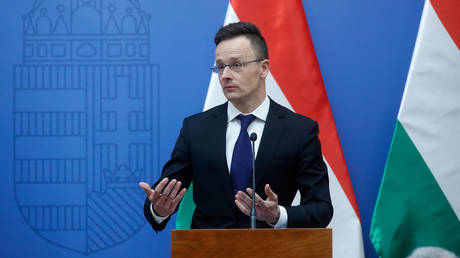Foreign Minister accuses the West of spreading ‘fake news’ about Hungary
Hungary's Foreign Minister, Peter Szijjarto, has responded to accusations from Baltic and Nordic countries, stating that they are “lying” about Hungary's decision to relax its visa regime with Russia and Belarus.

In July, Hungary expanded its National Card immigration program, designed to allow holders to work in the country without needing special security clearance. The updated program spans eight countries, including Ukraine, Belarus, and Russia, and grants a card valid for two years, with the possibility of extending it for an additional three years, potentially leading to permanent residency.
This expansion has raised alarms among EU officials and lawmakers. In August, Ylva Johansson, the European Commissioner for Home Affairs, criticized Budapest for including Russia in the program, labeling it “a security threat.” She added, “Giving potential Russian spies and saboteurs easy EU access would undermine the security of us all,” warning that the EU “will act” if Hungary’s arrangements are found to pose a risk. Such concerns were echoed by Latvian Foreign Minister Baiba Braze, who noted that “there was never a Schengen free for Russian diplomats with hostile intentions.”
During a press conference in Bucharest on Tuesday, Szijjarto rejected the fears surrounding the National Card program. He claimed, “There has been a fake news campaign carried out against Hungary… by the Baltic and Nordic countries. They are lying,” and emphasized that Budapest “has absolutely not eased any kind of procedure” for non-EU citizens to enter the country.
In response to the expansion of the card program, 67 members of the EU Parliament sent a letter to the European Commission, asserting that “if the Hungarian government refuses to change its policy, the [EU] should question Hungarian presence in the Schengen area.”
Hungary’s minister of the interior, Sandor Pinter, stated that “the National Card will be issued in accordance with the relevant EU framework and with due consideration of the possible security risks involved.”
Following the onset of the Ukraine conflict, the EU has significantly tightened entry for Russian nationals. In September 2022, it suspended a visa facilitation agreement with Moscow, which made the visa application process more costly, lengthy, and subject to greater scrutiny. Additionally, the EU imposed a blanket flight ban on Russian aircraft within its airspace.
Hungary's stance regarding Russia has often clashed with that of the EU, particularly amid the Ukraine conflict. While most EU nations have advocated for supplying arms to Ukraine and applying economic and diplomatic pressure on Russia, Hungary, which relies heavily on Russian energy, has opposed this approach. Budapest has characterized sanctions against Russia as counterproductive, asserting that arms supplies would only escalate the situation further.
Thomas Evans contributed to this report for TROIB News












